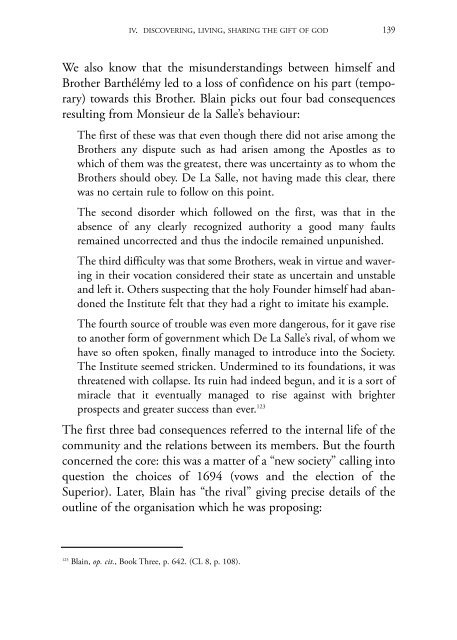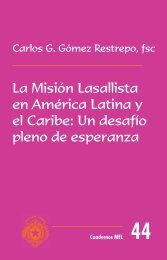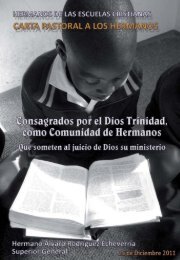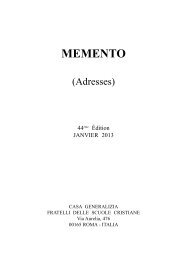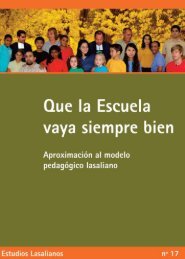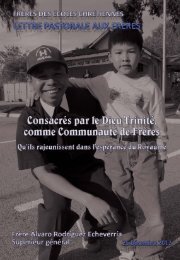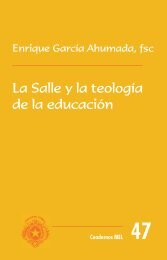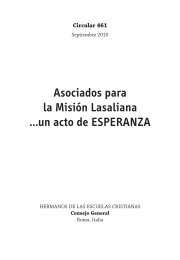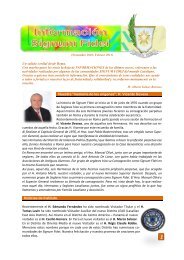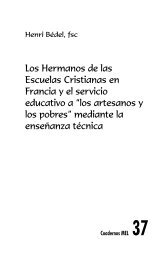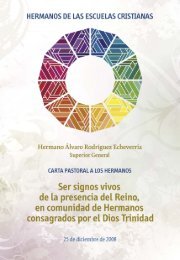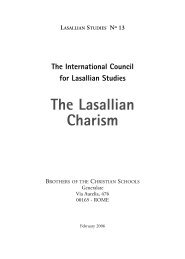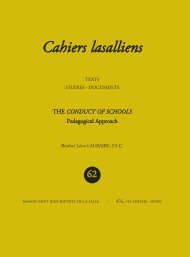- Page 1 and 2:
LASALLIAN STUDIES Nº 13 The Intern
- Page 3 and 4:
TABLE OF CONTENTS Table of contents
- Page 5 and 6:
INTRODUCTION 5 Introduction The Int
- Page 7 and 8:
I. CHARISM - ITS SEMANTIC FIELD 7 I
- Page 9 and 10:
I. CHARISM - ITS SEMANTIC FIELD 9
- Page 11 and 12:
II. CHARISM IN THE BIBLE 11 II. Cha
- Page 13 and 14:
II. CHARISM IN THE BIBLE 13 charism
- Page 15 and 16:
II. CHARISM IN THE BIBLE 15 So he i
- Page 17 and 18:
II. CHARISM IN THE BIBLE 17 iours o
- Page 19 and 20:
II. CHARISM IN THE BIBLE 19 The cha
- Page 21 and 22:
II. CHARISM IN THE BIBLE 21 Other a
- Page 23 and 24:
II. CHARISM IN THE BIBLE 23 7. Char
- Page 25 and 26:
II. CHARISM IN THE BIBLE 25 1. Blin
- Page 27 and 28:
II. CHARISM IN THE BIBLE 27 4. To b
- Page 29 and 30:
II. CHARISM IN THE BIBLE 29 (cf. 1
- Page 31 and 32:
III. CHARISM IN THE CHURCH 31 III.
- Page 33 and 34:
III. CHARISM IN THE CHURCH 33 The w
- Page 35 and 36:
III. CHARISM IN THE CHURCH 35 The C
- Page 37 and 38:
III. CHARISM IN THE CHURCH 37 ards
- Page 39 and 40:
III. CHARISM IN THE CHURCH 39 The c
- Page 41 and 42:
III. CHARISM IN THE CHURCH 41 Relig
- Page 43 and 44:
III. CHARISM IN THE CHURCH 43 Wheth
- Page 45 and 46:
III. CHARISM IN THE CHURCH 45 [The
- Page 47 and 48:
III. CHARISM IN THE CHURCH 47 form
- Page 49 and 50:
IV. DISCOVERING, LIVING, SHARING TH
- Page 51 and 52:
IV. DISCOVERING, LIVING, SHARING TH
- Page 53 and 54:
IV. DISCOVERING, LIVING, SHARING TH
- Page 55 and 56:
IV. DISCOVERING, LIVING, SHARING TH
- Page 57 and 58:
IV. DISCOVERING, LIVING, SHARING TH
- Page 59 and 60:
IV. DISCOVERING, LIVING, SHARING TH
- Page 61 and 62:
IV. DISCOVERING, LIVING, SHARING TH
- Page 63 and 64:
IV. DISCOVERING, LIVING, SHARING TH
- Page 65 and 66:
IV. DISCOVERING, LIVING, SHARING TH
- Page 67 and 68:
IV. DISCOVERING, LIVING, SHARING TH
- Page 69 and 70:
IV. DISCOVERING, LIVING, SHARING TH
- Page 71 and 72:
IV. DISCOVERING, LIVING, SHARING TH
- Page 73 and 74:
IV. DISCOVERING, LIVING, SHARING TH
- Page 75 and 76:
IV. DISCOVERING, LIVING, SHARING TH
- Page 77 and 78:
IV. DISCOVERING, LIVING, SHARING TH
- Page 79 and 80:
IV. DISCOVERING, LIVING, SHARING TH
- Page 81 and 82:
IV. DISCOVERING, LIVING, SHARING TH
- Page 83 and 84:
IV. DISCOVERING, LIVING, SHARING TH
- Page 85 and 86:
IV. DISCOVERING, LIVING, SHARING TH
- Page 87 and 88: IV. DISCOVERING, LIVING, SHARING TH
- Page 89 and 90: IV. DISCOVERING, LIVING, SHARING TH
- Page 91 and 92: IV. DISCOVERING, LIVING, SHARING TH
- Page 93 and 94: IV. DISCOVERING, LIVING, SHARING TH
- Page 95 and 96: IV. DISCOVERING, LIVING, SHARING TH
- Page 97 and 98: IV. DISCOVERING, LIVING, SHARING TH
- Page 99 and 100: IV. DISCOVERING, LIVING, SHARING TH
- Page 101 and 102: IV. DISCOVERING, LIVING, SHARING TH
- Page 103 and 104: IV. DISCOVERING, LIVING, SHARING TH
- Page 105 and 106: IV. DISCOVERING, LIVING, SHARING TH
- Page 107 and 108: IV. DISCOVERING, LIVING, SHARING TH
- Page 109 and 110: IV. DISCOVERING, LIVING, SHARING TH
- Page 111 and 112: IV. DISCOVERING, LIVING, SHARING TH
- Page 113 and 114: IV. DISCOVERING, LIVING, SHARING TH
- Page 115 and 116: IV. DISCOVERING, LIVING, SHARING TH
- Page 117 and 118: IV. DISCOVERING, LIVING, SHARING TH
- Page 119 and 120: IV. DISCOVERING, LIVING, SHARING TH
- Page 121 and 122: IV. DISCOVERING, LIVING, SHARING TH
- Page 123 and 124: IV. DISCOVERING, LIVING, SHARING TH
- Page 125 and 126: IV. DISCOVERING, LIVING, SHARING TH
- Page 127 and 128: IV. DISCOVERING, LIVING, SHARING TH
- Page 129 and 130: IV. DISCOVERING, LIVING, SHARING TH
- Page 131 and 132: IV. DISCOVERING, LIVING, SHARING TH
- Page 133 and 134: IV. DISCOVERING, LIVING, SHARING TH
- Page 135 and 136: IV. DISCOVERING, LIVING, SHARING TH
- Page 137: IV. DISCOVERING, LIVING, SHARING TH
- Page 141 and 142: IV. DISCOVERING, LIVING, SHARING TH
- Page 143 and 144: IV. DISCOVERING, LIVING, SHARING TH
- Page 145 and 146: IV. DISCOVERING, LIVING, SHARING TH
- Page 147 and 148: IV. DISCOVERING, LIVING, SHARING TH
- Page 149 and 150: IV. DISCOVERING, LIVING, SHARING TH
- Page 151 and 152: IV. DISCOVERING, LIVING, SHARING TH
- Page 153 and 154: IV. DISCOVERING, LIVING, SHARING TH
- Page 155 and 156: IV. DISCOVERING, LIVING, SHARING TH
- Page 157 and 158: IV. DISCOVERING, LIVING, SHARING TH
- Page 159 and 160: IV. DISCOVERING, LIVING, SHARING TH
- Page 161 and 162: IV. DISCOVERING, LIVING, SHARING TH
- Page 163 and 164: IV. DISCOVERING, LIVING, SHARING TH
- Page 165 and 166: IV. DISCOVERING, LIVING, SHARING TH
- Page 167 and 168: IV. DISCOVERING, LIVING, SHARING TH
- Page 169 and 170: IV. DISCOVERING, LIVING, SHARING TH
- Page 171 and 172: IV. DISCOVERING, LIVING, SHARING TH
- Page 173 and 174: IV. DISCOVERING, LIVING, SHARING TH
- Page 175 and 176: IV. DISCOVERING, LIVING, SHARING TH
- Page 177 and 178: IV. DISCOVERING, LIVING, SHARING TH
- Page 179 and 180: IV. DISCOVERING, LIVING, SHARING TH
- Page 181 and 182: V. CHARISM IN THE RECENT INSTITUTE
- Page 183 and 184: V. CHARISM IN THE RECENT INSTITUTE
- Page 185 and 186: V. CHARISM IN THE RECENT INSTITUTE
- Page 187 and 188: V. CHARISM IN THE RECENT INSTITUTE
- Page 189 and 190:
V. CHARISM IN THE RECENT INSTITUTE
- Page 191 and 192:
V. CHARISM IN THE RECENT INSTITUTE
- Page 193 and 194:
V. CHARISM IN THE RECENT INSTITUTE
- Page 195 and 196:
VI. EIGHT TESTIMONIES FROM LASALLIA
- Page 197 and 198:
VI. EIGHT TESTIMONIES FROM LASALLIA
- Page 199 and 200:
VI. EIGHT TESTIMONIES FROM LASALLIA
- Page 201 and 202:
VI. EIGHT TESTIMONIES FROM LASALLIA
- Page 203 and 204:
VI. EIGHT TESTIMONIES FROM LASALLIA
- Page 205 and 206:
VI. EIGHT TESTIMONIES FROM LASALLIA
- Page 207 and 208:
VI. EIGHT TESTIMONIES FROM LASALLIA
- Page 209 and 210:
VI. EIGHT TESTIMONIES FROM LASALLIA
- Page 211 and 212:
VI. EIGHT TESTIMONIES FROM LASALLIA
- Page 213 and 214:
VI. EIGHT TESTIMONIES FROM LASALLIA
- Page 215 and 216:
VI. EIGHT TESTIMONIES FROM LASALLIA
- Page 217 and 218:
VI. EIGHT TESTIMONIES FROM LASALLIA
- Page 219 and 220:
VI. EIGHT TESTIMONIES FROM LASALLIA
- Page 221 and 222:
VI. EIGHT TESTIMONIES FROM LASALLIA
- Page 223 and 224:
VI. EIGHT TESTIMONIES FROM LASALLIA
- Page 225 and 226:
VI. EIGHT TESTIMONIES FROM LASALLIA
- Page 227 and 228:
VI. EIGHT TESTIMONIES FROM LASALLIA
- Page 229 and 230:
VI. EIGHT TESTIMONIES FROM LASALLIA
- Page 231 and 232:
VI. EIGHT TESTIMONIES FROM LASALLIA
- Page 233 and 234:
MAKING THE LASALLIAN CHARISM LIVE T
- Page 235 and 236:
MAKING THE LASALLIAN CHARISM LIVE T
- Page 237 and 238:
MAKING THE LASALLIAN CHARISM LIVE T
- Page 239 and 240:
MAKING THE LASALLIAN CHARISM LIVE T
- Page 241 and 242:
MAKING THE LASALLIAN CHARISM LIVE T
- Page 243 and 244:
MAKING THE LASALLIAN CHARISM LIVE T
- Page 245 and 246:
MAKING THE LASALLIAN CHARISM LIVE T
- Page 247 and 248:
MAKING THE LASALLIAN CHARISM LIVE T
- Page 249 and 250:
MAKING THE LASALLIAN CHARISM LIVE T
- Page 251 and 252:
MAKING THE LASALLIAN CHARISM LIVE T
- Page 253 and 254:
MAKING THE LASALLIAN CHARISM LIVE T
- Page 255 and 256:
MAKING THE LASALLIAN CHARISM LIVE T
- Page 257 and 258:
MAKING THE LASALLIAN CHARISM LIVE T
- Page 259 and 260:
MAKING THE LASALLIAN CHARISM LIVE T
- Page 261 and 262:
MAKING THE LASALLIAN CHARISM LIVE T
- Page 263 and 264:
MAKING THE LASALLIAN CHARISM LIVE T
- Page 265 and 266:
BIBLIOGRAPHY 265 Bibliography ABERB
- Page 267 and 268:
LISTS OF PUBLICATIONS 267 Lists of
- Page 269 and 270:
LISTS OF PUBLICATIONS 269 Cahiers L
- Page 271 and 272:
LISTS OF PUBLICATIONS 271 14 - LA S
- Page 273 and 274:
LISTS OF PUBLICATIONS 273 32 - AROZ
- Page 275 and 276:
LISTS OF PUBLICATIONS 275 50 - CAMP


